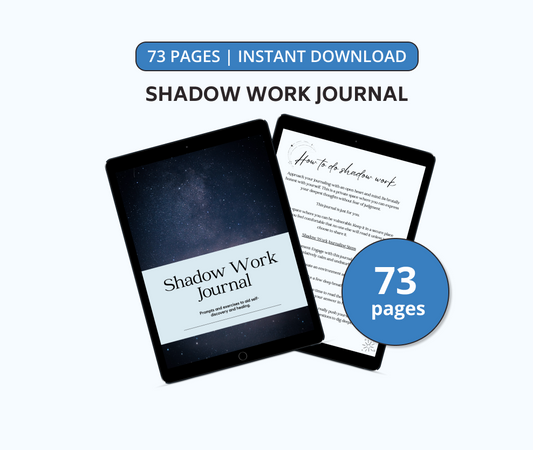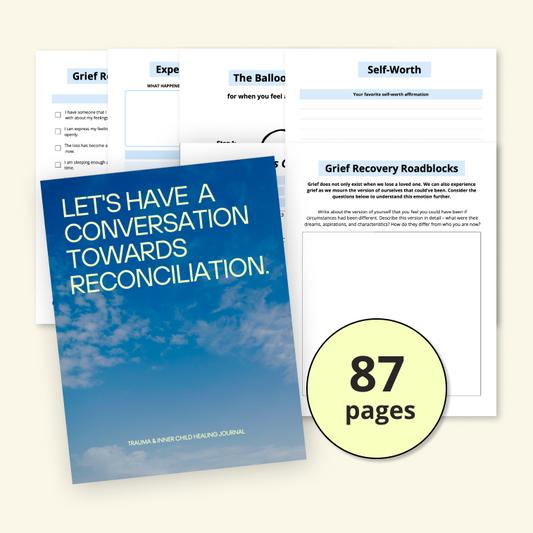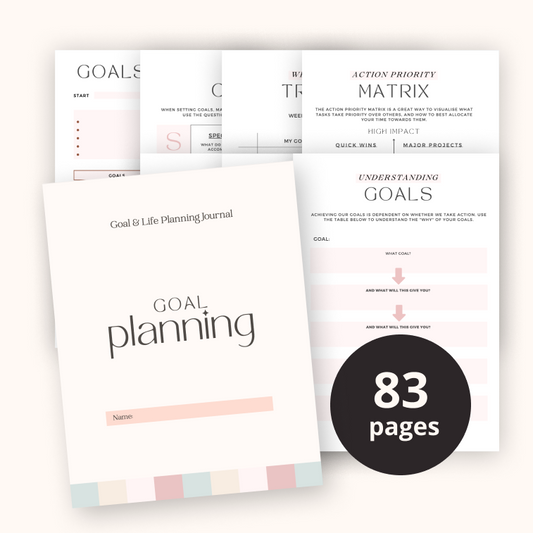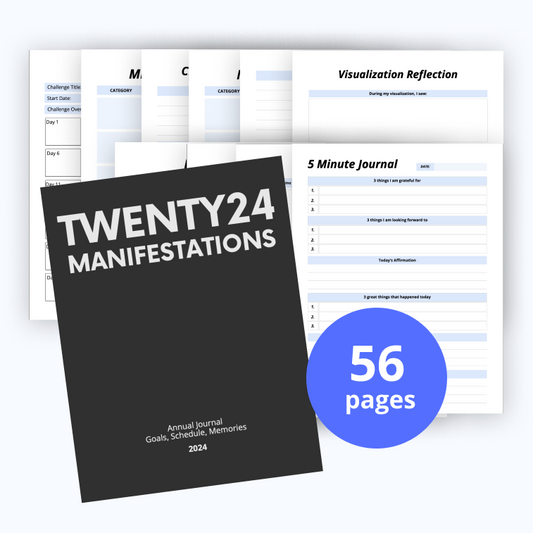Feeling like your mind’s a tangled web of worries? You’re not alone. Anxiety’s a sneaky beast that can creep up and throw your inner calm out of whack. But what if you could turn the tables on it? Imagine having a secret weapon to navigate through those choppy emotional waters.
That’s where journal prompts for anxiety come in. They’re not just empty words on a page; they’re a lifeline to understanding and managing your feelings. Get ready to dive into a treasure trove of prompts designed to untangle your thoughts and soothe your spirit. Keep reading, because you’re about to embark on a journey to reclaim your peace of mind.
What is Anxiety?
Anxiety is like that uninvited guest who pops in just when you’re about to cherish your peace and quiet. Imagine your mind running a marathon but your body’s stuck charging at the starting line; well, that’s anxiety for you. It’s your brain’s way of reacting to stress and alerting you to potential danger ahead. Think of it as a pesky alarm clock that won’t hit snooze, incessantly reminding you to check and double-check if everything’s going to be alright.
This crafty culprit can manifest in many forms, from the heart-thumping rush of a panic attack to the subtle gnawing worry that keeps you up at night. You’re not alone if you’ve felt its grasp. In fact, anxiety disorders are among the most common mental health issues, affecting millions of people just like you.
Journaling can be a stellar sidekick in your quest to tease apart the tangled threads of anxious thoughts. Guided journal prompts, specifically tailored by your pals here at Wholesome, encourage you to poke at anxious feelings with a gentle curiosity. Ready to wield your pen like a sword and duel your doubts on paper? Check these out:
- What are three fears you’d like to conquer and why?
- Describe a recent situation where you felt anxious. What might you say to a friend who experienced the same?
- Reflect on a time you overcame a challenge. How did you do it?
- Pen down five things in your life right now that feel totally in your control.
- How do you normally respond to stress? List three healthier coping strategies.
- What’s something new you learned this week that made you smile?
- Imagine your anxiety as a character. What does it look like and what would you tell it?
- Write about a place where you feel completely at peace. What makes it special?
- When do you feel the most relaxed? How can you incorporate more of that into your daily routine?
- Jot down your proudest moment from the past month. How did it make you feel?
- Compose a letter of forgiveness to yourself for a past mistake.
- Recall a compliment someone gave you that made your day. Why did it mean so much?
- Think of a goal you’re working towards. What are some steps you can take this week to get closer to it?
- List five things you’re grateful for today and why.
The Power of Journaling for Anxiety
Journaling is like your personal chill pill. When anxiety seems like an unwelcome guest refusing to leave, putting pen to paper can give you the strength to show it the door. Imagine defusing stress with every word you write; that’s the muscle journaling flexes.
As you delve into the world of self-reflection, guided journal prompts are your compass, making sure you don’t get lost in the thicket of your thoughts. Your mind’s a maze, but journaling lights up the path to clarity and peace.
Wholesome’s guided journals are your cozy nook for honest chats with your inner self. These prompts aren’t just questions; they’re keys to unlock the vault of your mind where anxiety lurks. Scribble away; you’re on a journey to reclaim your calm!
- What’s zapping your zest today?
- Describe the anxiety in color and shape.
- List five things that made you smile this week.
- What’s your top worry right now, and how can you slice it into manageable pieces?
- Replay a moment of calmness—what brought you there?
- Write a thank-you note to your body for supporting you through stress.
- Draft a letter to your future, less anxious self.
- Explore a fear—what’s beneath it?
- Describe a place that makes you feel safe.
- Outline a self-care routine for your worst anxiety days.
- Jot down three affirmations that counter negative self-talk.
- Remember a situation when you overcame fear—what was your strategy?
- Sketch the “you” that’s free from anxiety.
- Pen down the pros and cons of your current coping mechanisms.
- Recall a time someone helped ease your anxiety—what did they do?
- Name the emotions you feel when anxiety hits.
- Design a playlist of songs that soothes your soul.
- Create a list of people and pets that bring you joy.
- Imagine your life without anxiety—what does it look like?
- Identify what triggers your anxious thoughts—is there a pattern?
How Journaling Helps with Anxiety
Discovering the link between journaling and anxiety relief is like finding a hidden gem in your mental wellness toolkit. Imagine having a personal, judgment-free zone where you can unload your anxious thoughts and fears—it’s all in the power of the written word. When you lay it all out on paper, you’re not just venting; you’re engaging in cognitive behavioral therapy techniques, unraveling the twisted threads of your thoughts and emotions.
As you begin to journal, you’ll notice a pattern to your worries, which is pretty eye-opening. Writing them down helps you step back and see them from a new angle. It’s kind of like having a conversation with yourself, where you’re both the speaker and the listener. And there’s no need to hold anything back; your journal won’t spill your secrets.
Writing consistently in a journal provides you with clear insight into your triggers and thought patterns. This self-awareness is a powerful step toward managing your anxiety. Instead of letting anxious thoughts simmer, journaling brings them to the surface, making them easier to tackle. Plus, you can track your progress over time, celebrating those small victories on your journey to calmness.
Let’s not forget, Wholesome’s guided journals are chock-full of prompts to zero in on what’s really going on in that beautiful mind of yours. Here are 20 Journal Prompts for Anxiety to get you started on your path to tranquility:
- What’s weighing heavily on your heart right now?
- Describe a situation where you felt calm and in control.
- How does your anxiety manifest in your body?
- Capture a moment where anxiety was a false alarm.
- What are your go-to coping strategies? List them out.
- Pen down your biggest fear and a step you can take to face it.
- Write about someone who supports you unconditionally.
- Reflect on a time you overcame a stressful event.
- What anxious thoughts repeat in your mind? Challenge them here.
- Imagine your safe place. What does it look, smell, and feel like?
- List out what you can and cannot control in a stressful situation.
- Recall three moments of unexpected joy from the past week.
- Scribble down a pep talk to yourself for tough times.
- Explore the best piece of advice you’ve heard about dealing with anxiety.
- What would you say to a friend feeling anxious? Write it to yourself.
Journal Prompts for Understanding Anxiety
Do you sometimes feel like anxiety’s got your number on speed dial? Well, you’re not alone. Anxiety has a sneaky way of creeping in and setting up shop in our minds. But hey, let’s outsmart it together with some savvy journal prompts designed by us here at Wholesome! Our prompts are like little keys that unlock the secrets behind your worries. They’ll help you dive deep into the what’s, why’s, and how’s of your anxiety.
Get ready to spook away those anxiety goblins with these 20 journal prompts. They’re specially crafted to help you unwrap those anxiety layers and get to the heart of the matter:
- What’s the anxiety thought taking center stage in your mind right now?
- When do you feel anxiety’s grip the tightest—is it a time of day, a situation, or with certain people?
- Describe your safe space—the place where anxiety doesn’t seem to find you.
- Recall a time when anxiety showed up uninvited. How did that make you feel?
- Picture your anxiety as a character. What does it look like? What does it say?
- What coping strategies have you tried? List them out.
- Which physical sensations are your telltale signs that anxiety is on the horizon?
- What’s one thing you wish people knew about your anxiety?
- If your anxiety had a volume control, what level is it at right now and why?
- When did you first notice anxiety creeping into your life?
- How does your anxiety affect your day-to-day routines?
- What message do you think your anxiety is trying to convey to you?
- If you could have a conversation with your anxiety, what would you say?
- List three things that tend to spark your anxiety.
- What are some activities that lower your anxiety?
- How does your anxiety influence your interactions with others?
- Write about a day you conquered a big anxious challenge.
- What affirmation can you tell yourself when anxiety knocks on your door?
- How do you distinguish between a normal worry and an anxiety-triggered worry?
- Imagine a world without anxiety. What does it look like for you?
Journal Prompts for Managing Anxiety
Navigating your thoughts can sometimes feel like trekking through a wild jungle, right? Don’t worry, you’re not alone! Journaling is your trusty compass, helping you find your calm within the chaos.
Imagine having a safe space where you can untangle your anxieties, one word at a time. That’s the beauty of using journal prompts—they’re like little nudges guiding you to explore and understand the intricate maze of your thoughts. And, lucky for you, Wholesome is here to sprinkle some of that guided journal magic into your daily routine!
Ready to embark on a journey to manage your anxiety? Let’s dive into these thoughtfully crafted journal prompts, a mix of reflection, exploration, and a dash of self-discovery:
- What’s the main worry on your mind right now, and why do you think it’s holding such a power over you?
- Describe a place that makes you feel calm. What is it about that place that soothes you?
- Recall a time when you overcame a stressful situation. What strengths did you discover about yourself?
- List five things you’re grateful for today and explain why they lighten your mood.
- When you feel anxious, what physical sensations do you notice in your body?
- Write a letter to your anxiety. What would you want to tell it?
- Identify a thought that increases your anxiety. Can you challenge it with evidence or a positive spin?
- Think of a person who makes you feel safe and loved. What qualities do they possess that affect you positively?
- If anxiety was a color, what would it be and why?
- Create a playlist of songs that uplift your spirit. Which lyrics speak to you the most?
- Imagine your life without anxiety. What’s the first thing you would do?
- Reflect on a fear you’ve conquered. What did you learn from that experience?
- Note down a mantra that helps you feel more grounded during anxious moments.
- Scribble down all the things you can control in your life at this moment. How does this awareness affect your anxiety?
- Envision comforting someone else who’s anxious. What advice or perspective would you offer them?
- Trace the roots of your anxiety today. What external factors might be contributing?
- Journal a day in your ideal, anxiety-free life. What detailed activities do you see yourself doing?
Techniques for Effective Journaling
When starting your journey with journaling, it’s crucial to create a comfortable and welcoming environment. This helps in fostering a safe space for your thoughts and feelings.
Set a regular schedule to ensure consistency. Whether it’s first thing in the morning or right before bed, stick to a time when your mind is clear, and you can focus on your inner dialog.
Embrace the freedom of a no-judgment zone. Your journal is your confidential companion; nothing you write is too petty or too grand. Let your thoughts flow without censoring them – honesty is key.
Don’t rush the process. Sometimes insights and breakthroughs take time to surface. Give yourself the grace to explore your thoughts and feelings without pressure.
Using prompts is like having a guide on your anxiety-alleviating adventure. Here’s a hearty list of 20 prompts from us at Wholesome:
- Reflect on a moment today when you felt calm. What was happening around you?
- List five things you feel grateful for right now.
- What are your top three worries today, and what can you do about them?
- Describe your ideal place of tranquility. What does it look, smell, and feel like?
- When did you last feel proud of yourself, and why?
- Jot down three achievements you’re proud of.
- Outline steps you’ve taken in the past to overcome a challenge.
- Envision where you see yourself in five years. How does that image make you feel?
- Write a letter to your anxiety as if it’s a person. What would you like to say?
- Identify a thought that often triggers anxiety. Can you challenge it?
- If your worries were a storm, sketch or describe what the clearing of that storm would look like.
- What self-care actions can you commit to this week?
- Pen down a quote that inspires you to be strong and why it resonates with you.
- Think of a color that soothes you. Why does it have that effect?
- Who are the people that support you? Describe how they help ease your anxiety.
- Imagine your anxiety as a knot. Each time you journal, visualize unraveling a piece of it.
- What activities make you lose track of time? How can you incorporate more of these into your life?
- Consider a challenge you are facing. What can it teach you?
- Write about a time when you felt at peace with yourself.
Conclusion
Harnessing the power of journaling is a transformative step toward managing your anxiety. With the strategies you’ve learned and the prompts provided, you’re well-equipped to embark on a journey of self-discovery and healing. Remember to carve out time for yourself, honor your feelings without judgment, and be patient with your progress. As you continue to reflect and write, you’ll likely find a sense of clarity and calm that can lead to profound changes in your life. Embrace this practice, and let your journal be a sanctuary for your thoughts and a tool for your well-being.




